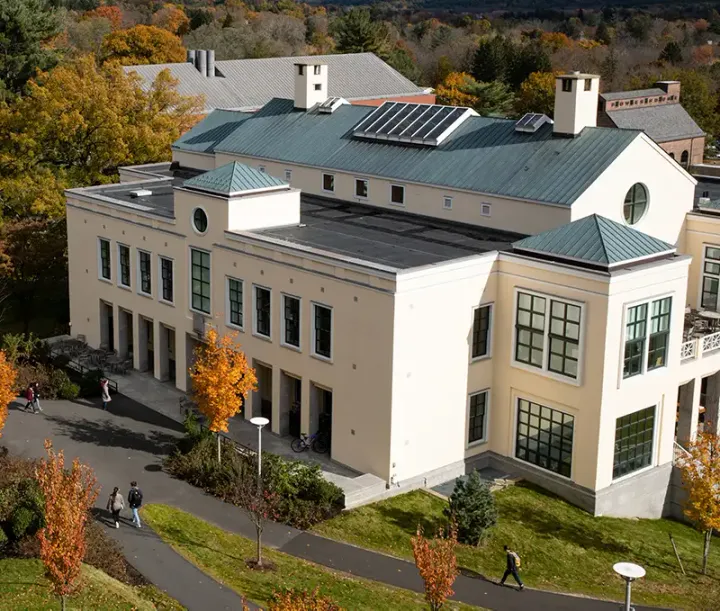ACTS Program Adjustments lead to Decreases in Wait Times and Frustrations
After a challenge-laden rollout, the Amherst College Textbooks (ACTS) program initiated a variety of changes for this semester. As a result, students described acquiring course materials and textbooks this week as a far more efficient experience than in the fall.

At the start of this semester, students who were apprehensive about waiting in long lines at the Alumni House for their course materials — expecting a similar experience to last semester — were met with a pleasant surprise: short lines and quick service.
The Amherst College Textbook Solution (ACTS) program, first implemented last semester to make course materials more accessible for all students, faced significant logistical criticism during its rollout. Students reported long wait lines, communication issues, and delays in receiving materials.
However, this semester, students found the distribution process at the Alumni House much less exhausting. “It was much faster and organized. I got the email that all my books were ready this morning and I came in just now to get it — it was very smooth,” said Jackson Hersom ’27.
According to Ralph Johnson, executive director of campus operations, current wait times are estimated to peak around seven minutes, as opposed to 30-45 minute waits last semester. In October, Johnson wrote an article for The Student outlining ACTS’ goals and ongoing improvements, such as longer open hours and improved communication with students, faculty, and Follett, the distribution company — changes that now are beginning to take effect.
The introduction of weekend hours reduced the volume of the lines and provided greater flexibility for students’ schedules. According to Sherry McDonald, course material manager at the Alumni House, an estimated more than 400 students took advantage of the weekend hours to pickup their materials.
Ellie Yang ’27 picked up her books on Saturday and described the weekend hours as helpful.
“I just got added to this class, and I received the email with my books ready right away. We have a reading due next week, so it was nice to get the books before the class,” Yang said.
The committee overseeing ACTS’ implementation also took steps to ensure that all course materials arrived on time this year, conducting weekly progress reviews with Follett and course material tracking. According to Johnson, 99% of materials arrived on time in the first week, compared to 96% last semester.
“Last semester, it took nearly a month to reach the 99% mark. [Now,] The books that are not here yet are due to publisher delays, a book being out of print, or a book that has not yet been published for the first time. In all cases, the faculty member has been notified so adjustments can be made,” he clarified.
Catherine Sanderson, professor of psychology and member of the Textbook Solution Taskforce, previously attributed part of last semester’s course material shortages to Amherst’s extended add-drop period. For the spring semester, she explained that the school worked with Follett to order extra books, ensuring that unexpected increases in class enrollment wouldn’t leave students without materials.
The Alumni House also made logistical changes to improve organization. According to Johnson, “Follett thoroughly trained the distribution staff in the Alumni House” and restructured the order system, organizing orders by students’ last names instead of order numbers. Books are also now arranged by authors’ last names, simplifying the process for professors to check on their requested titles.
As in the previous semester, students still have the option to opt out of the program for a stipend of $288. However, faculty remain hopeful that as the program continues, fewer will choose to opt out.
“The reality is, if a giant number of students start opting out, the program will end … because it won’t be financially sustainable. My hope is that students will see it as something that is good for all students,” Sanderson said.
ACTS did not cover the costs of any course materials for Five College students last semester. This spring, though, it began providing course packs to those students at no cost, though other course materials remain excluded.
“My hope is that the other colleges will join this kind of program, then it would just be free for everyone,” Sanderson said, “Our goal should be to say to these other colleges and universities, ‘this is a wonderful program and this really helps students access materials, and then everyone can do it.’”
Sanderson said that in her experience, ACTS not only ensured equal access to course materials for all students, but also allowed for a richer classroom experience. Once she knew that all students had the opportunity to read the materials before attending class, it opened space for discussion-based classes and a more interactive learning environment.
“Learning is not just what happens in the scope of the class, but it's also in the learning that happens by doing the reading,” Sanderson said. “And so to me, the textbook program is just a wonderful way for Amherst to illustrate its commitment to equity and inclusion for all students regardless of financial means.”
She is hopeful that, as the school becomes more familiar with the program, they will be able to continue addressing the challenges that come with it and improving student’s experiences.
“And, you know, when I retire from Amherst, [knock on wood], I think the Textbook Taskforce is gonna be the single most important contribution that I've made to the college,” she said.





Comments ()